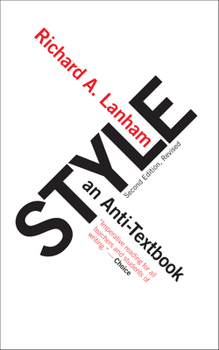Style: an Antitextbook
Select Format
Select Condition 
Book Overview
"A necessary manual for those interested in the perpetuation, and the possibilities, of good English prose."--Harper's Magazine
"[Lanham's] style is notable for its audacity, liveliness, and grace."--The Times Literary Supplement
"The most applicably provocative book on the subject of prose style available. Imperative reading for all teachers and students of writing."--Choice
This humorous and accessible classic on style calls for the return of wordplay and delight to writing instruction. Richard Lanham argues that many tomes on writing, with their trio of platitudes--clarity, plainness, sincerity--lie "upon the spirit like wet cardboard."
"People seldom write to be clear. They have designs on their fellow men. Pure prose is as rare as pure virtue, and for the same reasons...The Books [Lanham's term for misguided composition textbooks], written for a man and world yet unfallen, depict a ludicrous process like this: 'I have an idea. I want to present this gift to my fellow man. I fix this thought clearly in mind. I follow the rules. Out comes a prose that gift-wraps thought in transparent paper.' If this sounds like a travesty, it's because it is one. Yet it dominates prose instruction in America."--from Chapter 1
Richard A. Lanham is professor emeritus of English at the University of California, Los Angeles, and president of Rhetorica, Inc., a consulting and editorial services company. He is the author of numerous books on writing, including A Handlist of Rhetorical Terms, Analyzing Prose, The Electronic Word, and most recently, The Economics of Attention.
Related Subjects
Creative Writing & Composition Criticism & Theory History & Criticism Language Arts Literary Literary Criticism & Collections Literature Literature & Fiction Movements & Periods Reference Rhetoric Words, Language & Grammar Writing Writing Skills Writing, Research & Publishing Guides




